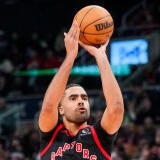Tim Duncan walks away just the way he played -- with no fanfare
There's no better testament to greatness than the era of team success that Tim Duncan left behind.

Somehow, you always knew it would happen like this. One day, we'd wake up and Timothy Theodore Duncan would be gone.
Without taking a bow. Without making a peep.
Just the way he played.
Duncan, 40, retired from basketball Monday, with a press release that didn't even include a quote. After five championships and 19 years of quietly, professionally and methodically carving out a resume as the best power forward of all time, what else was there to say?
Duncan always did his talking between the lines, and when he walked off the floor, he left it all there.
This is what he did on May 12, after a 119-93 loss to the Oklahoma City Thunder that ended the Spurs' season -- and, as it turned out, the mighty Duncan's career. He played just under 35 minutes that night, scored 19 points and had five rebounds. He made 7 of his 14 shots from the field, 5 of 6 from the free-throw line, committed two turnovers and blocked one more shot.
As he shook hands with the victors -- Russell Westbrook and Kevin Durant chief among them -- you wondered if this was the last time we'd see Tim Duncan on a basketball court.

Now we know that it was. He was a gentle giant who was also fierce, yet never had the ego or inclination to let anybody know about it. He was a forever portrait of class and competitiveness that will never be replicated.
The inevitable end, which the Spurs always knew was coming but could never predict, finally arrived.
"He's gonna let us know when he's ready to end it," Spurs GM R.C. Buford told me once, as I inquired -- three years too soon, it turned out -- about how the team would handle it when Father Time finally took Duncan's hand and walked him away for good.
"The alternative," Buford said, "we don't really approach that because there isn't an answer."
Finally now, there is.
You want to argue about legacies? Now, Duncan's is complete, so it's fair game. Since the Spurs drafted him No. 1 overall out of Wake Forest in 1997, they won 71 percent of their games -- the best 19-year stretch in NBA history and better than any team in any other North American team sport, too. The Spurs never once had a losing record during Duncan's career; never once missed the playoffs.
Only once did they win fewer than 50 games, and that was during the lockout-shortened 1998-99 season, when they went 37-13 (.740) and won the first of five championships.
Duncan leaves in his wake an unprecedented era of team success that in some ways detracted from his own individual greatness. They'll never talk about points, rebounds or dunks when it comes to the Big Fundamental. They'll talk about winning, and they'll talk about championships. There can be no greater testament to excellence.
The Spurs were so good in the Duncan era that it's preposterous even to those who rode shotgun through history, right alongside him.
"I wish I could put time in a box and relive it down the road in 10 years," Ginobili told me recently. "We know it's impossible. Yes, we think about this, how it has a deadline. It's going to end sooner or later; sooner than later. Once it's over and you've got time to step back and see the whole picture, you really appreciate it. I'm going to be 50, 60, even 70 and look back and say, 'This was amazing. What an amazing run.'"
Ginobili, who turns 39 this month, will be back with the Spurs for one more season. Tony Parker, the other foundational piece of the dynasty, will be back, too. The team now turns to a future with Kawhi Leonard and LaMarcus Aldridge leading the way. All these years, they've just kept pushing -- kept winning. And now, for the first time in two decades, they'll have to do it without the man who was the catalyst for it all.
They never lamented the inevitable end of an era, because that just wasn't the Spurs' way.
"We know that it can't continue forever, because that's not the nature of the beast," Gregg Popovich told me once, on one of the Spurs' many postseason drives. "But to look ahead and mourn when that day comes is kind of a waste of time. So we just try to be the best team that we can each year; and that doesn't mean you're going to win a championship every year. Those are pretty tough to win. A lot tougher than most people think."
A lot easier, though, when you have a foundation like Duncan, just putting in the work day after day, year after year, while barely saying a word.
The greatest power forward of all time walked away for good on Monday, and he didn't get a farewell tour or a parade. He didn't need one. Tim Duncan's farewell tour lasted 19 years, and wow, it was something to behold.

















